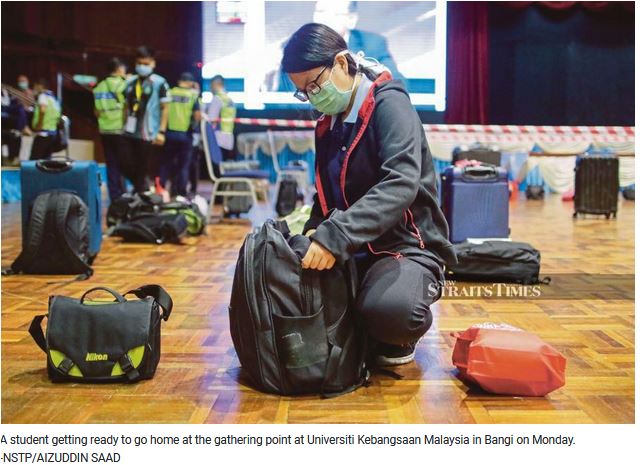Letting students go home benefits all
Emeritus Professor Tan Sri Dato' Dzulkifli Abdul Razak
Opinion - New Straits Times
April 30, 2020
THE night of April 27 will certainly be a night to remember for students, parents, university administrators and educators. Talking to students who were set to balik kampung, one can feel the excitement and pleasant surprise that they were finally making their way home.
Prior to this, it was more about students flying home from overseas where the situations were (and still is) far worse than in Malaysia. Some even tested positive upon arrival. While those here seemed "safer", their wishes were unattended to until recently.
The parents' excitement were more apparent judging from the phone calls and e-messages that poured in, in support of the decision. This is in contrast to the days before since the Movement Control Order (MCO) was introduced on March 18.
They have been "ordered" to be physically "separated" from the children for more than a month, with the prospect that it is not going to end soon. Over time, they become more vulnerable with many unpredictable things coming into play in the lives of the students.
The universities cannot brush it aside. In this regard, the parents, who somehow can better sense how their children are doing, cannot wait to receive their loved ones. With the decision to let the students go home, much of this predicament disappeared.
It was a win-win move that benefited all parties concerned. Acknowledging that the exercise can be complex, but it is not rocket science, as amply demonstrated on the eventful night. Even more so when the exercise was accomplished without any hitch with all reported to arrive home safe and sound.
Educators are equally happy. Often they are regarded as "foster" parents to students who are away from home. On top of this, however, educators have other concerns beyond just the issues related to aspects of personal welfare and safety. Utmost on their minds is how to best carry out the noble task and responsibility to deliver "education".
And this is not just a matter of conveying information without a high level of preparedness. Regardless of the mode of delivery, the ensuing preparedness is a prerequisite to ensure fairness, equity and quality to all involved with a good and functional education ecosystem.
Be it online, face-to-face or the blending of the two, all must aim to realise the three crucial aspects at the very least. In the case of the current pandemic, how to secure this can be a real challenge in view of the target audiences scattered throughout a location. The university must be professional and impartial in arriving at the most optimal decision.
In other words, education should in no way be compromised while keeping Covid-19 at bay, particularly in being fair, equitable and reaching for the highest quality. These cannot be achieved by a one-size-fits-all formula in a top-down bureaucratic way. It needs flexibility and creativity that any successful education ecosystem is known for.
To the university administrators, this is precisely their preoccupation in enabling a stable atmosphere for education. This is evident during the MCO period, where "new" procedures and guidelines have to be crafted, including the rationale and logistics to evacuate students as the pressure on them — related to mental and emotional health — becomes unmanageable.
That's why the management lauded the decision to send back the students. Delaying it any further can translate into something harmful especially in a highly contentious situation.
Here the issue of preparedness becomes yet a significant determinant in deciding how a stable and conducive situation can be integrated as part of the organisational culture, rather than just another academic demand. Overall, the decision to reunite the students with their loved ones is a courageous act that ought to be applauded by all.
The writer, an NST columnist for more than 20 years, is International Islamic University Malaysia rector
The views expressed in this article are the author's own and do not necessarily reflect those of the New Straits Times

